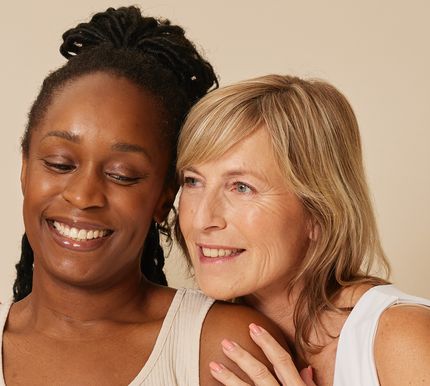

Vaginal dryness after menopause: why it doesn't resolve naturally and what you can do
Dryness, irritation, pain during intercourse… vaginal symptoms are undoubtedly among the most troublesome complaints of menopause. While other menopause symptoms, such as hot flushes, tend to diminish after menopause, vaginal dryness often continues to affect many women. Why is this the case? And what can you do about it?
Does sex suddenly feel painful? Or do you frequently experience a burning sensation in your intimate area? This is not a coincidence. The oestrogen that keeps your vaginal lining supple and healthy decreases during menopause. We’ll explain how to best support your vaginal health.
But first: why does your vagina become drier during menopause?
The main reason is the drop in oestrogen. You may already notice it during perimenopause: your vagina feels drier as your oestrogen levels begin to fluctuate and gradually decline. During menopause and beyond, this can become more pronounced as your oestrogen levels remain low.
Oestrogen plays a vital role in the health of your vagina. Discover how it impacts vaginal dryness. In short, a drop in oestrogen can lead to:
- Reduced blood flow to the mucous membrane, causing it to dry out more quickly.
- Thinner and less elastic vaginal walls, which exacerbates dryness.
- Decreased natural lubrication, making irritation or pain (e.g., during intercourse) more likely.
- A change in pH levels due to fewer lactobacilli, which help maintain the vaginal acidity balance.
What symptoms might you experience?
Did you know that over 30% of women going through menopause experience vaginal dryness? You’re certainly not alone! How these symptoms manifest varies from woman to woman. Some experience more itching, others feel pain during everyday activities like cycling, and some have pain or even bleeding during sex.
But vaginal dryness isn’t the only issue you might face during menopause. Hormonal changes in your body can lead to other vaginal symptoms, such as:
- Painful urination: The decrease in oestrogen can dry out the urethra, causing a burning sensation or pain during urination.
- Recurring infections: Changes in vaginal pH make you more susceptible to infections, such as urinary tract infections and thrush.
- Reduced libido: If your vagina feels dry, sex can become less enjoyable, which naturally may reduce your desire for intimacy.
- Frequent urge to urinate: Oestrogen supports the muscles and tissues in and around the vagina. When oestrogen levels drop, these areas receive less support, potentially leading to prolapse and frequent urination.
- Urinary incontinence: Weakening of the pelvic floor muscles and supporting tissues—often due to hormonal changes—can result in involuntary urine leakage, for example, when coughing or laughing.
Why vaginal symptoms persist after menopause
Many menopause symptoms resolve on their own once your body adjusts to lower hormone levels after postmenopause. Unfortunately, this is not the case for vaginal dryness. After menopause, your oestrogen levels remain low, meaning vaginal dryness often continues to affect many women unless addressed.
Additionally, your body changes as you age. The mucous membrane naturally becomes drier and less elastic, which can worsen vaginal dryness. Health conditions such as diabetes or autoimmune diseases, which are more common as you age, or the use of certain medications (like antidepressants or antihistamines), can also exacerbate symptoms.
Give your vaginal health the attention it deserves
Since vaginal dryness after menopause often doesn’t resolve on its own, it’s especially important to provide your body with the right support in time. Try the following:
- Use water-based lubricants (during sex): These alleviate vaginal dryness and make intimacy enjoyable again.
- Pay attention to your diet to support vaginal health: Ensure you get enough vitamin E, found in nuts, seeds, whole grains, avocados, and leafy greens. Vitamin E can help maintain healthy mucous membranes. Essential fatty acids, such as those in oily fish (like salmon and mackerel), flaxseeds, chia seeds, and walnuts, contribute to good moisture balance. Zinc and proteins help repair vaginal tissues.
- Exercise daily: Whether it’s walking or another form of physical activity, exercise improves blood circulation, which is essential for healthy vaginal tissues and helps keep your vagina hydrated.
- Stay hydrated: This may not come as a surprise, but drinking enough water or herbal tea helps keep your vaginal tissues better hydrated.
- Try natural remedies like maca and sea buckthorn oil: Maca can support hormonal balance, and sea buckthorn oil hydrates your skin. Add maca to your smoothie or take it as a capsule, and sea buckthorn oil is available in oil or capsule form.
Things to avoid:
- Smoking: Smoking reduces blood flow in your body, including to your vaginal mucous membranes. Less blood flow means less oxygen and nutrients, making your mucous membranes thinner and drier, which can worsen discomfort.
- Soap and scented products: Your vaginal flora is balanced thanks to good bacteria and a natural protective layer. Soap and scented products can disrupt this balance, increasing irritation and dryness.
- Tight clothing: Tight clothing can cause friction and create a warm, moist environment, which may irritate your skin. Opt for breathable fabrics like cotton and wash your intimate area with water only.
- Excess sugar and refined carbohydrates: Sugar and refined carbs feed harmful bacteria and yeast, disrupting the balance in your vagina. This can contribute to vaginal dryness and, especially in women prone to it, increase the risk of yeast infections or irritation.
- Consider Local Oestrogen Cream: If you experience significant pain and dietary or lifestyle changes aren’t enough, local hormone therapy can help temporarily replenish hormone levels and relieve vaginal dryness.
What hormone therapy can do for you
Did you know that you can start hormone therapy up to 10 years after your last period, ideally before age 60? It’s an effective solution for vaginal dryness, itching, and other discomforts—often providing relief within just a few days! There are various options, such as local treatments with oestrogen creams or ovules.

Sources
- Calleja-Agius, J., & Brincat, M. P. (2015). Het urogenitale systeem en de menopauze. PMC. https://doi.org/10.1016/j.maturitas.2014.07.010
- Faubion, S. S., Sood, R., & Kapoor, E. (2017). Genitourinair syndroom van de menopauze: Beheerstrategieën voor de klinicus. PMID. https://doi.org/10.1097/SPV.0b013e3181d7e86e
- International Menopause Society. (2023). Urogenitale problemen. IMS Factsheet. Geraadpleegd van https://www.menopauseinfo.org/wp-content/uploads/2023/09/IMS-Factsheet-13-urogenital.pdf
- Jokar, A., Davari, T., Asadi, N., Ahmadi, F., & Foruhari, S. (2016). Vergelijking van hyaluronzuur vaginale crème en geconjugeerd oestrogeen bij de behandeling van vaginale atrofie bij postmenopauzale vrouwen: Een gerandomiseerde gecontroleerde klinische proef. International Journal of Community Based Nursing and Midwifery, 4(1), 69-78.
- Krause, M., Wheeler, T. L. 2nd, Richter, H. E., & Snyder, T. E. (2010). Systemische effecten van vaginaal toegediende oestrogeentherapie: Een overzicht. Female Pelvic Medicine & Reconstructive Surgery, 16(3), 188-195. https://doi.org/10.1097/SPV.0b013e3181d7e86e
- Larmo, P. S., Yang, B., Hyssälä, J., Kallio, H. P., & Erkkola, R. (2014). Effecten van de inname van duindoornolie op vaginale atrofie bij postmenopauzale vrouwen: Een gerandomiseerde, dubbelblinde, placebo-gecontroleerde studie. Maturitas, 79(3), 316-321. https://doi.org/10.1016/j.maturitas.2014.07.010
- Muhleisen, A. L., & Herbst-Kralovetz, M. M. (2016). Menopauze en het vaginale microbioom. PMID. https://doi.org/10.1097/SPV.0b013e3181d7e86e
Tips and guidance











